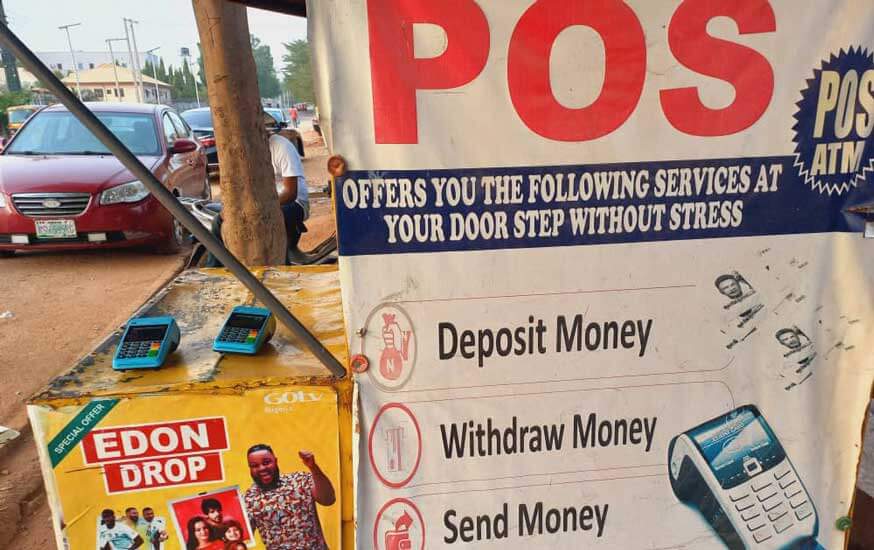Hike In Terminal Charge By Opay, Moniepoint Is Turning POS Business Into Unattractive Venture—Operators
The new terminal charges imposed by fintech like Opay and Moniepoint Inc. and the high cost of operation have turned the Point of Sales (POS) business which was very lucrative a few months ago into an unattractive venture.
In Nigeria, millions of people survive and feed their dependents with the proceeds from POS business.
Advertisement
As of November 2022, POS machines deployed by merchants and individuals across Nigeria rose to 1.6 million.
The business saw its peak in February 2023 when the Central Bank of Nigeria (CBN) withdrew N1,000, N500 and N200 old notes valued N2trn and printed only N400bn.
During the period, currency circulation was N982bn down from N1.33trn in January.
Operators across the Federal Capital Territory who spoke to THE WHISTLER lamented how the recent review in terminal charges by at least N10 and the cost of buying receipt paper and other expenses have cut into their profit.
Advertisement
Sylvia Ojonne, a resident of Karu who is in her late 20s is an operator struggling to keep her POS business afloat.
She said, “Before terminal charges of N10,000 was N50 now it’s N60 and my customer’s charge rate is N150. So, I make N90, from every N10,000 transaction. We are just financing the rich while getting poor.
“I tried reviewing my charge, and my number of patronages dropped, this is because people have varieties of POS operators to patronize, and with the availability of cash in the system, chances of reviewing the charge rate are slim. Mind you, I transport myself to the bank to withdraw this cash. “
Ojonne also said the industry is saturated, adding that there are issues with the uniformity of charges among Abuja POS operators.
Since the removal of the fuel subsidy on May 29 by President Bola Ahmed Tinubu and the floating of the naira, inflation has spiked across the country. The Bank of America projects that inflation will hit 30 per cent in the coming months.
Advertisement
In Gwarinpa, Ubgon Etim, a father of three, told THE WHISTLER that the cost of financing his POS business is becoming overbearing.
Etim now spends double on transportation, almost 67 per cent more to buy printing papers and he is debited N10 extra for terminal charges.
Etim said, “In January a packet of receipt paper was sold for N900, now it’s N1,500. When I asked why it’s increasing almost every time I visit the market, I was told the dollar has increased.
“Aside from terminal charges, there is still a target that must be met daily, and it’s based on the nature of POS to be used. The government should have removed subsidy during the cashless policy, so we can suffer everything once.”
Elsewhere in Lagos and Enugu, POS operators have readjusted their prices to conform with economic realities.
Udoka Ikemefuna, a resident of New Haven extension, Enugu state told THE WHISTLER that charges on withdrawals and deposits from N6,000 to N9,500 are pegged at N300, while N10,000 to N13,000 is charged at N400.
Advertisement
Just recently, the Association of Mobile Money and Bank Agents in Nigeria, Lagos Chapter reviewed prices for transfers and withdrawals.
The Public Relations Officer of the association, Lagos Chapter, Stephen Adeoye tagged it as a unified price list for Point of Sales (PoS) transactions.
He said “N1,000 to N2,000, will be N100 for withdrawal. N3,500 to N4,000 N200. N4,100 to N6,400 N3,00. N6,500 to N7,900 is N4,000. Also, N8,000 to N10,900, N500. N11,000 to N14,000 is N600. N14,500 to N17,900 will be charged N700 and N18,000 to N20,000 is N800 for withdrawal.
“Like we said, depending on your location, you can also step it down for people depending on the circumstance but it should not go more than this.
“For deposits, N1,000 to N4,900 is N100; N5,000 to N10,900 is N200. N11,000 to N20,900 is N300. N21,000 to N30,900 is N400. N31,000 to N40,000 is N500 and N41,000 to N50,000 is N600 for a deposit or you call it transfer.”



